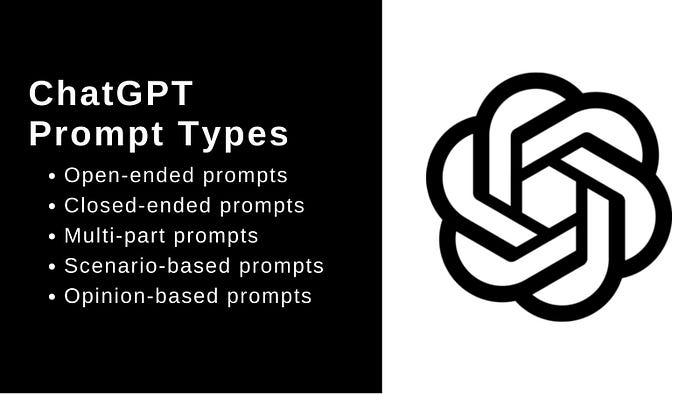ChatGPT is a natural language processing model developed by OpenAI. It is a powerful and flexible language model that has the potential to revolutionize the way that people interact with computers and artificial intelligence.
Do you think that gun control laws are necessary, and how might they impact public safety?
Prompts
Prompts are integral to initiating a conversation with a language model, as they provide context and direction to the model. By serving as the input to the model, they help ensure relevant and useful responses. Poorly constructed prompts, on the other hand, can lead to irrelevant or unhelpful responses, leading to frustration and a subpar user experience.

Prompts Types
There are 5 different Types of Prompts
- Open-ended prompts
- Closed-ended prompts
- Multi-part prompts
- Scenario-based prompts
- Opinion-based prompts
Open-ended prompts
Open-ended prompts provide no specific direction or constraints to the user. Instead, they encourage open exploration and creativity. Open-ended prompts can be useful for generating ideas, encouraging brainstorming, and promoting imaginative responses.
Examples of Open-ended prompts can be
- What do you think makes a good leader?
- How do you think technology has changed the way we live and work?
Closed-ended prompts
Closed-ended prompts provide specific constraints or guidelines for the user to follow. They may ask for a specific piece of information, a particular response, or a limited set of choices. Closed-ended prompts can be useful for gathering specific data, testing knowledge, or directing the user toward a particular outcome.
Examples of Closed-ended prompts can be
- Which ocean borders the east coast of the United States?
- What is the smallest country in the world?
Multi-part prompts
Multi-part prompts require the user to respond to multiple questions or prompts in a sequential or interconnected way. They can be useful for exploring complex issues, encouraging deeper thinking, or providing a more comprehensive response.
Examples of Multi-part prompts can be
- What are the advantages and disadvantages of living in a big city, and how do they compare to those of living in a small town
- Can you explain the concept of artificial intelligence, and discuss the ethical implications of its development and use?
Scenario-based prompts
Scenario-based prompts present a specific situation or scenario to the user and require them to respond based on that context. They can be useful for testing problem-solving skills, encouraging empathy, or exploring hypothetical situations.
Examples of Scenario-based prompts can be
- You’re planning a party for a friend and you need to make sure all dietary restrictions are accommodated. What steps would you take to ensure everyone has a good time?
- You’re planning to start a small business but you don’t have a lot of capital. What steps would you take to get started?
Opinion-based prompts
Opinion-based prompts require the user to express their personal opinions or beliefs on a particular topic. They can be useful for exploring values, testing critical thinking skills, or encouraging self-reflection.
Examples of Opinion-based prompts can be
- What is your opinion on social media, and how has it impacted society?
- Do you think that gun control laws are necessary, and how might they impact public safety?
These are the different types of prompts that we can use to get the best results. I have created an e-book that will have an effective way of writing prompts here is the link
This book covers the effective way of writing this book covers different types of prompts with examples of each type in detail and also covers the prompting for a different audience. Each part contains many prompts and examples.